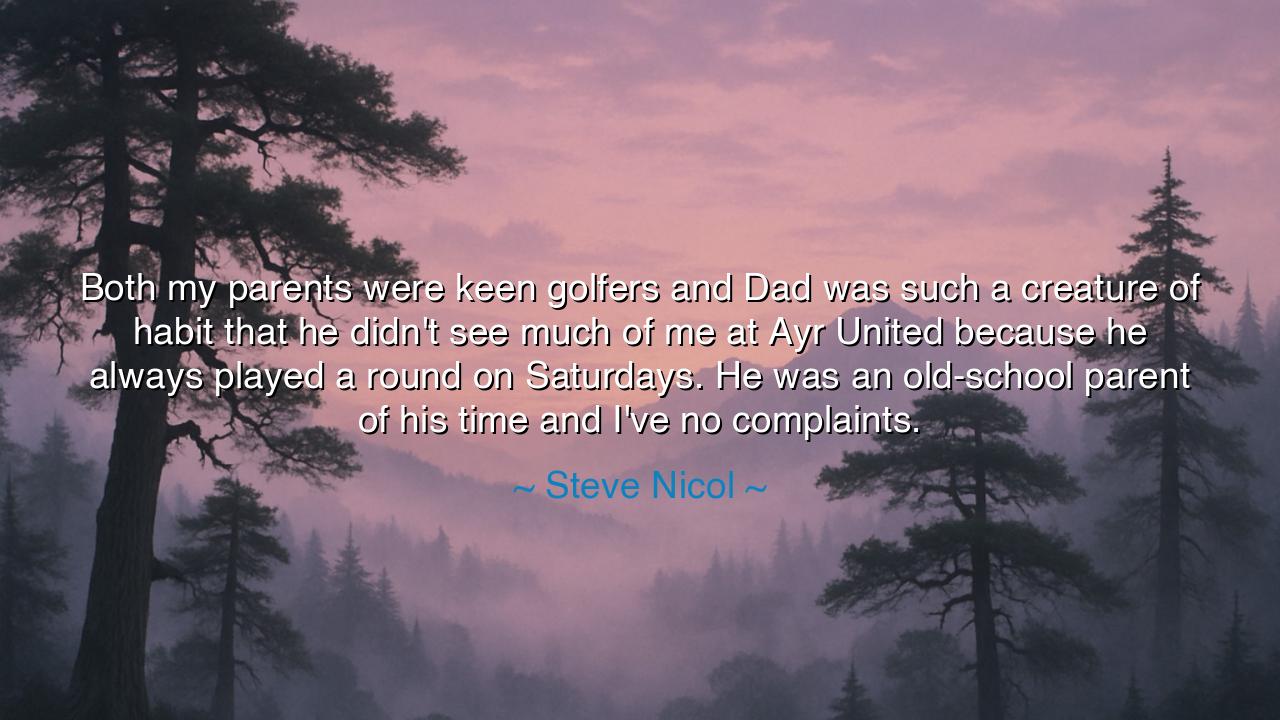
Both my parents were keen golfers and Dad was such a creature of
Both my parents were keen golfers and Dad was such a creature of habit that he didn't see much of me at Ayr United because he always played a round on Saturdays. He was an old-school parent of his time and I've no complaints.






The words “Both my parents were keen golfers and Dad was such a creature of habit that he didn't see much of me at Ayr United because he always played a round on Saturdays. He was an old-school parent of his time and I've no complaints,” spoken by Steve Nicol, carry a quiet yet profound wisdom — the wisdom of acceptance, of perspective, and of understanding the hearts of those who raised us. Beneath their calm tone lies the story of a son who has learned to see his father not through the eyes of judgment, but through the eyes of compassion. His reflection speaks to the eternal truth that parents, too, are human — bound by their habits, shaped by their times, and limited by what they knew to give.
In saying that his father was “a creature of habit,” Nicol does not speak with bitterness. Rather, he acknowledges a certain steadfastness that defined his father’s generation — a time when routine was strength, when stability and duty were the greatest virtues a man could offer. His father’s Saturdays on the golf course were not acts of neglect, but of rhythm, of continuity. It was the way he ordered his world, the way many men of his age did — through repetition, through structure, through the reliable comforts of habit. This was the “old-school parent”, who showed love not in words or embraces, but through consistency, provision, and example.
Nicol’s acceptance — “I’ve no complaints” — is a mark of emotional maturity, a quiet greatness that comes from seeing beyond oneself. The child might once have wondered why his father was not there on the sidelines, but the man understands that every generation expresses affection in its own language. His father’s absence was not indifference; it was the rhythm of a life built on duty. This understanding transforms memory from resentment into gratitude, from longing into peace. It is a lesson the ancients knew well — that to honor one’s parents is not to judge them by one’s own measure, but to see them with mercy and understanding.
In the ancient world, fathers were often figures of distance and discipline, much like Nicol’s — revered, respected, but rarely intimate. The Roman philosopher Marcus Aurelius wrote of his own father, praising him for moderation, steadfastness, and dignity — not for warmth. He did not complain, because he understood that love wears many faces. The ancient virtue of filial piety, found in every culture — from the Greeks to the Chinese — taught that the child’s role was not to demand perfect love, but to recognize the imperfect humanity in those who gave them life. So too does Nicol, with his simple words, remind us that gratitude is greater than grievance.
This story, though personal, mirrors the evolution of love through generations. In Nicol’s father’s time, affection was restraint; it was love shown through labor, love clothed in silence. Today, we live in an age that values expression and connection — and yet, we often forget to appreciate the quiet sacrifices that built the foundations we now stand upon. Nicol bridges these two worlds — respecting the old while living in the new. His statement is not about golf or missed matches; it is about perspective, the realization that to understand another’s way is to release oneself from bitterness.
History, too, gives us many such lessons. Consider Abraham Lincoln, who grew up under a father of strictness and practicality. Thomas Lincoln was not tender or expressive; he valued survival over sentiment. The young Abraham often felt unrecognized, perhaps unloved — yet in later years, he came to embody the virtues of endurance and humility that his father, unknowingly, had instilled in him. Like Nicol, Lincoln’s greatness lay in his ability to transform what he lacked into wisdom, to take from the hardness of his upbringing the strength to become something more — not in defiance of his father, but in continuation of him.
So, my children, take this teaching to heart: learn to see your parents not as ideals, but as people. They, too, were shaped by their world, by fears, by habits, by histories you will never fully know. Do not measure their love by its form, but by its endurance. Even the father who sits on the golf course instead of the sidelines may still love deeply, quietly, in his own way. To understand this is to free yourself from the weight of unmet expectations — and to replace it with grace. For in the end, gratitude is the highest form of remembrance, and acceptance the purest form of love.






AAdministratorAdministrator
Welcome, honored guests. Please leave a comment, we will respond soon